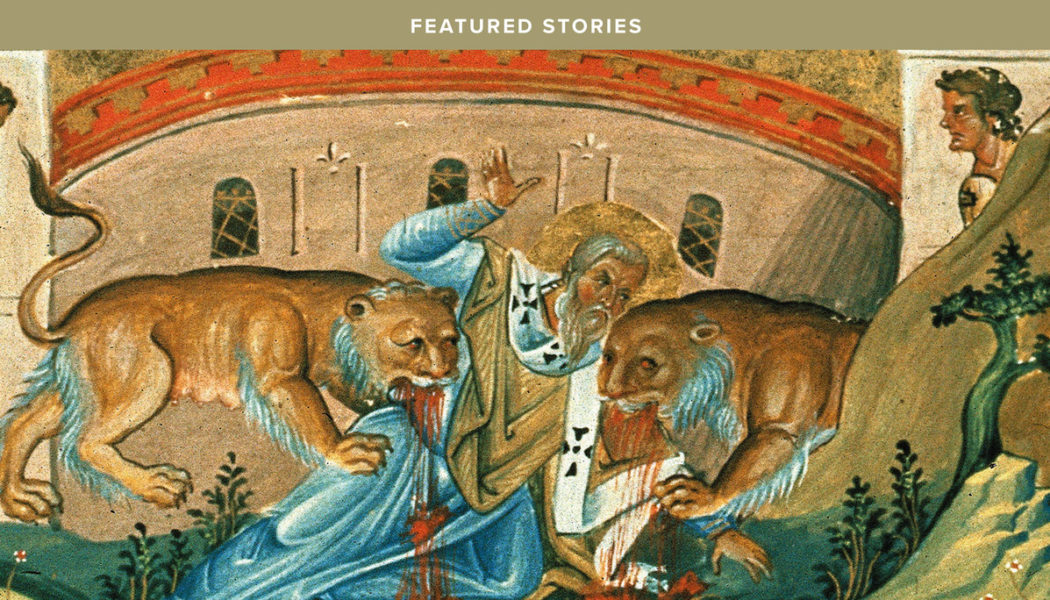
Sometime early in the second century, St Ignatius, the bishop of Antioch in Syria, was arrested and marched to Rome. The Emperor at the time was Trajan (r. 98–117), whose correspondence with Pliny, a Roman governor in what is now northern Turkey, reveals his attitude toward Christians. Trajan did not take seriously the more unsavory rumors circulating about Christians, but he agreed with Pliny that, “whatever the nature of their creed, stubbornness and inflexible obstinacy” in sticking to Christianity “surely deserve to be punished”—by death.[1] Several decades later, apologists like St Justin Martyr and Tertullian would note that Christians could be condemned merely for bearing that name, irrespective of actual or alleged crimes (Justin, First Apology 3–4; Second Apology 2; Tertullian, Apology 1–4, 44). The letters of Pliny and Trajan confirm the justice of their complaint. Ignatius certainly expected such treatment, and tradition holds that he was fed to lions. Today the Church celebrates Ignatius’s “birth” to eternal life.
It was at Ignatius’s own city of Antioch that Jesus’ disciples had first been called “Christians” (Acts 11:26). The name was probably originally used by unbelievers with a sneer—“little ‘messiah’ people”—but believers quickly embraced it as a badge of honor: “if anyone suffers as a Christian”—rather than as a genuine criminal—“let him not be ashamed, but let him glorify God in that name” (1 Pet. 4:16). “I am a Christian” became the martyrs’ constant, courageous refrain. For his part, Ignatius hoped that he would “not merely be called a Christian but actually prove to be one” (Romans 3.2).[2] He similarly urged others “that we not just be called Christians, but that we actually be Christians” (Magnesians 4.1).
Ignatius’s understanding of authentic Christianity has to be gleaned from his seven surviving letters, all written en route to Rome: five to local churches in Asia Minor; one to St Polycarp, bishop of Smyrna (one of those five churches); and one ahead to the church at Rome. The letters are brief, forceful, and deceptively simple. While their vigor is evident, their depth is only slowly recognized.
Ignatius’s teaching is rich, but it can be summed up in a word. True Christianity is all about unity—unity with and in the Trinity, and, as a result, unity with one another. On this point, Ignatius is in good company. Jesus prayed to the Father “that they may be one, even as we are one” (John 17:26), and St Paul likewise coordinated Christian unity to the Trinity: “There is one body and one Spirit—just as you were called to the one hope that belongs to your call—one Lord, one faith, one baptism, one God and Father of all…” (Eph. 4:4–6; cf. CCC 813). For Ignatius, this divine unity is mediated, maintained, and expressed in several interrelated ways, including profession of orthodox faith, obedient communion with the bishops and clergy, and Eucharistic worship (cf. CCC 815). Like Paul (cf. 1 Cor. 10:17), Ignatius strongly associates the Eucharist with unity. After insisting on the importance of avoiding schism, he writes, “Make it a point, then, to participate in one Eucharist. For the flesh of our Lord Jesus Christ is one, and one is the cup that yields unity in his blood” (Philadelphians 4:1; my trans.). The Eucharist liturgically enacts belief in the reality of the Incarnation of Christ, who is “both from Mary and from God,” truly “Son of Man and Son of God” (Ephesians 7.2; 20.2). Right observance of the Eucharist thus safeguards unity in the apostolic faith. Ignatius also stresses the link between Eucharistic worship and communion with the Church’s hierarchy, which fosters unity among the community of believers (Smyrnaeans 8.1–2).
Ignatius’s mentions of the Eucharist are not overwhelmingly numerous, but they are arresting and powerful. In one famous passage, Ignatius laments that “those who hold heretical opinions about the grace of Jesus Christ … refuse to acknowledge that the Eucharist is the flesh of our savior Jesus Christ, which suffered for our sins and which the Father by his goodness raised up” (Smyrnaeans 6.2). This is stunningly realistic language. Those who are eager to defend the Catholic doctrine of the Real Presence to naysayers and doubters (who include, according to recent research, many self-identified Catholics) are quick to point to this text as very early evidence for this teaching. They are not wrong to do so. But if we fixate on the fact that Ignatius believes in the Real Presence, we run the risk of failing to notice why the Real Presence matters to him.
Because it unites us to Christ who suffered and was raised, the Eucharist “is the medicine of immortality, the antidote we take in order not to die but to live forever in Jesus Christ” (Ephesians 20.2). This “medicine,” however, does not leave us untransformed, for in this case, the medicine is the Physician himself (see Ephesians 7.2). He himself is “our never-failing life” (Magnesians 1.2). To be united to the person of Jesus also means being united to his faithfulness and love toward both God and others. In one passage, Ignatius simply identifies our faithfulness with “the flesh of the Lord” and our love with “the blood of Jesus Christ” (Trallians 8.1). The Eucharist enables us to love God and one another with Christ’s own fidelity and charity, which is the very content of salvation (Ephesians 14.1). This insight is further clarified and illustrated in how Ignatius links the Eucharist to two other central Christian realities: martyrdom and care for the poor.
To the Roman church Ignatius writes, “I want the bread of God, which is the flesh of Christ who is of the seed of David; and for drink I want his blood, which is incorruptible love” (Romans 7.3). The context makes it clear that Ignatius is not speaking here of a sacramental celebration but of his own impending martyrdom. “I am God’s wheat,” he writes earlier, “and I am being ground by the teeth of the wild beasts, so that I may prove to be pure bread” (Romans 4.1). Because it unites us to Christ’s loving obedience to the Father, supremely expressed in his death for our sake, the Eucharist prepares us for martyrdom, and martyrdom is a completion of our reception of the Eucharist. Ignatius can write to the Christians at Smyrna that they “are established in an unshakable faith, having been nailed, as it were, to the cross of the Lord Jesus Christ in both body and spirit, and firmly established in love by the blood of Christ” (Smyrnaeans 1.1). The faithfulness and love they encounter in the Eucharist already conforms them to the Lord’s death on the cross, of which Ignatius hopes “to be an imitator” in his martyrdom (Romans 6.3). For Ignatius there is no other way, for Christ’s “life is not in us unless we voluntarily choose to die in his suffering”—whether or not this takes the form of red martyrdom (Magnesians 5.2).
Union with Christ and his Father additionally entails love of others, especially the needy. In the context of the line quoted earlier about the reality of the Eucharist, Ignatius also remarks that the heterodox “have no concern for love, none for the widow, none for the orphan, none for the oppressed, none for the prisoner or the one released, none for the hungry or thirsty” (Smyrnaeans 6.2). To Ignatius’s way of thinking, failure to acknowledge Christ in the Sacrament is intrinsically connected with failure to care for him in the downtrodden. Today this may seem counterintuitive, but it was not for ancient Christians, who recognized the very same Christ, “God [who] appeared in human form to bring the newness of eternal life” (Ephesians 19.3), in the Eucharist and in the poor. The Eucharist unites us to the one who, “though he was rich, … became poor, so that you by his poverty might become rich” (2 Cor. 8:9). As the Catechism of the Catholic Church teaches, “The Eucharist commits us to the poor” (1397). Ignatius’s exhortation to Bishop Polycarp to exercise “constant care for both physical and spiritual concerns” is thus strictly in keeping with his doctrinal and liturgical convictions. In this way Polycarp will be able to “[f]ocus on unity, for there is nothing better” (Polycarp 1.2).
For Ignatius, in sum, by uniting us to God and neighbor in faith and love, the Real Presence of Christ in the Eucharist transforms us, so that we may not merely be called Christians, but truly be Christians. St Ignatius, pray for us!
This is the first of a five-part series by Dr. Sehorn on the Eucharist.








